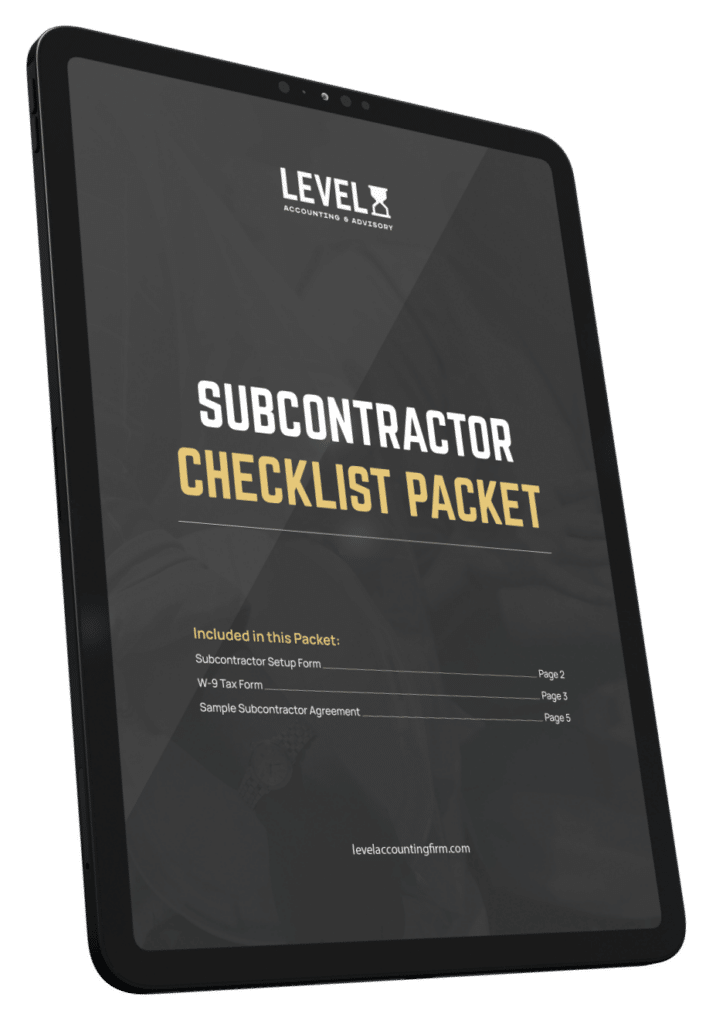As an independent contractor, understanding your tax obligations is crucial for both compliance and financial success. Proper tax planning can help you retain more of your income while ensuring you meet all IRS requirements. This guide will walk you through the essential aspects of independent contractor taxes and help you make informed decisions about your business.
Business Structure: The Foundation of Your Tax Strategy For Independent Contractors
Choosing the right business structure is one of the most important tax decisions you’ll make as an independent contractor. Working with a professional to determine your optimal business structure can lead to significant tax savings and help prevent compliance issues.
Here are the main business structures available to independent contractors & small business owners:
Sole Proprietorship

The most common structure, representing about 73% of U.S. small businesses. While it’s the simplest option with minimal paperwork, it provides no personal asset protection and may not be the most tax-efficient choice. Your business income is reported on your personal tax return, and you’re personally liable for all business debts and obligations. We typically only recommend filing as a sole proprietor if you business is very small – such as a less than part-time gig and something that is temporary.
Limited Liability Company (LLC)
If you’re going all in on your business and plan to grow your business over time – we strongly recommend creating an LLC. An LLC offers personal asset protection while maintaining tax flexibility. Your personal assets are protected from business liabilities, and you can choose how you want to be taxed – as a sole proprietor, partnership, or corporation. This structure provides a good balance of liability protection and tax options for most contractors.
An LLC can be taxed as another entity (such as S-Corp or C-Corp) later down the road – while still maintaining the legal protections of an LLC.
S Corporation
A popular choice for contractors looking to minimize self-employment taxes. You’ll need to run payroll and pay yourself a reasonable salary, but remaining profits can be distributed as dividends, which aren’t subject to self-employment tax. This structure requires more complex compliance and paperwork but can offer significant tax savings for qualifying businesses.
We recommend filing as an LLC and getting yourself on payroll once you hit the $70,000 in profit mark. This is where we see the tax benefit outweigh the additional paperwork and cost of maintaining S- Corp status.
C Corporation
This structure is typically more complex than most contractors need. It offers the strongest liability protection but comes with double taxation – profits are taxed at the corporate level, and then dividends are taxed again at the personal level. Generally best suited for businesses planning to go public or seek significant outside investment.
Understanding Your Tax Obligations As An Independent Contractor
As an independent contractor, you’re responsible for several types of taxes:
1. Self-Employment Tax (15.3%)
This tax covers both the employer and employee portions of Social Security (12.4%) and Medicare (2.9%). It applies to your net business income and is mandatory for self-employed individuals.
2. Federal Income Tax
Your income tax rate depends on your tax bracket, which is determined by your taxable income after deductions and credits. Proper planning and documentation of business expenses can help minimize your taxable income.
3. State and Local Taxes
These vary by location and jurisdiction. Check with your state and local tax authorities to understand your specific obligations.
Professional Bookkeeping: A Critical Investment for Independent Contractors
Accurate bookkeeping is essential for tax compliance and business success. While DIY bookkeeping might seem cost-effective, it can lead to significant issues:
- Incorrect expense categorization leading to missed deductions
- Compliance issues that could trigger IRS audits
- Difficulty securing business loans due to poor record-keeping
- Challenges in establishing business value for potential future sale
At Level Accounting and Advisory, we recommend professional bookkeeping services to ensure accuracy, compliance, and optimal tax planning.
Job Costing Best Practices
For contractors managing multiple projects, efficient job costing is crucial. We recommend keeping job costing operations in-house, where your team has immediate access to:
- Project receipts and invoices
- Purchase orders
- Payment records
- Estimates and bids

While software like JobTread and BuilderTrend offer QuickBooks Online integration, we recommend keeping job costing separate from your main accounting system. JobTread, our recommended solution, offers excellent support and training at an affordable price point. This means, you can use their support and training to have an admin or yourself (if you’re a one person business) handle the job costing.
Important Tax Deadlines for 2025

Quarterly Estimated Tax Due Dates For Independent Contractors
- January 15, 2025
- April 15, 2025
- June 16, 2025
- September 15, 2025
Annual Filing Deadlines for Independent Contractors
- Personal Income Tax (Form 1040): April 15, 2025
- Partnerships (Form 1065): March 17, 2025
- S Corporations (Form 1120S): March 17, 2025
- Contractor Forms (1099-NEC): January 31, 2025
Missing these deadlines can result in penalties and interest charges, making it crucial to maintain a reliable tax filing system. Find out what options you have if you file late or do not pay your taxes on time by clicking here.
Professional Tax Support
Tax requirements for independent contractors are complex and constantly changing. At Level Accounting and Advisory, we specialize in contractor tax planning and compliance. Our team keeps your books IRS-ready and manages your tax filing, allowing you to focus on growing your business.
Contact us to learn how we can help optimize your tax strategy and maintain accurate financial records.
Note: This guide provides general information for educational purposes. Individual tax situations vary, and professional advice is recommended for your specific circumstances.
Did this blog help you? Check out our other blogs below:
- 1099 vs W2: What Contractors Need to Know About Hiring
- Standard Deduction 2025
- Cash vs Accrual Accounting for Construction Businesses
- 1099s: Everything Contractors Need to Know
- Why Should Contractors Consider an S-Corp Election
- How to Pay Yourself as an S-Corp Owner
- 20 Tax Deductions for Independent Contractors
- Cost of Small Business Accounting
- Section 179 Deduction: List of Tools & Vehicles that Qualify
- Write Off Your Vehicle For Taxes: How to Guide
- Tax Deductions vs Tax Credits
- Tax Deductions for Independent Contractors
- Contractor Accounting Software
- More can be found Here


